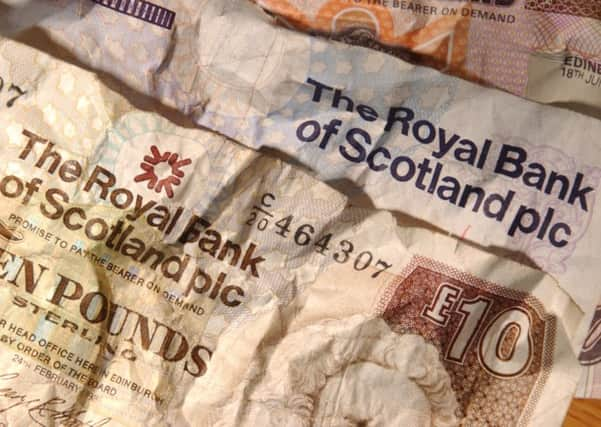Scottish independence: UK ‘could agree pound deal’


All major UK parties have ruled out a currency union but this has been dismissed as pre-referendum posturing by the SNP, who insist Scotland will keep the pound with the backing of the Bank of England.
Advertisement
Hide AdAdvertisement
Hide AdFiscal Affairs Scotland, led by former Treasury economist and Labour special adviser John McLaren, said “there may well be a way to allay the UK Government’s economic concerns over the implications of a currency union”.
But he said the consequences of reaching such a compromise means “Scotland will effectively have little in the way of control over its monetary and fiscal policy”.
“To some this may seem at odds with the needs of an independent Scotland, as well as the rationale for it,” he said.
“Equally, concerns on the degree of trade-off that is required to satisfy both sides may mean that it is difficult in practice to conclude a successful negotiation.”
Fiscal Affairs Scotland executive director Jo Armstrong said: “For the two governments to reach agreement over the fiscal rules and practices that would need to apply is only the first step towards achieving a working and long-term sustainable currency union.
“Debt and regulatory negotiations would also be needed, as would ensuring whatever is proposed meets the potentially conflicting expectations of both the general public and the financial markets.”
The report states: “The cost to Scotland of such a currency union agreement with the UK government is likely to be severe restrictions in Scotland’s ability to run its own monetary policy and set its overall fiscal targets, possible policy restrictions on setting its own tax rates like corporation tax, regulatory restrictions that are likely to have a severe limit on Scotland’s ability to have a unique financial sector, as opposed to a regional version of that operating in London.
“While the Governor of the Bank of England and the Permanent Secretary of the UK Treasury accept that, in theory, such a currency union is possible, at present, UK politicians have effectively ruled out such a currency union under any conditions.
Advertisement
Hide AdAdvertisement
Hide Ad“In the end, any such agreement over a currency union will not depend solely on rational economic arguments but on the political negotiations by the two governments as well as, and perhaps more importantly, on how the international financial markets react to whatever might ultimately be proposed.”
Their intervention follows a weekend of political wrangling over Scotland’s currency options.
Former European Council president Ruairi Quinn, who drafted the economic criteria for joining the euro, said today that Scotland will have to agree to join the euro as a condition of joining the European Union.
Shadow chancellor Ed Balls reiterated that a currency union is “off the table” and said the euro may be the “least worst of all the bad options”, insisting sterlingisation would lead to a flight of financial services and that a separate currency would be “very expensive, very risky”.
Scottish Liberal Democrat leader Willie Rennie said Alex Salmond must provide further clarity on his currency plans in the second live TV debate tonight, amid recent comments by the First Minister that sterlingisation could be a “transitional option”.
Mr Rennie said: “To exit from his Plan A and move to his Plan B, Alex Salmond has introduced his Plan Transition.
“If Alex Salmond proposes that an independent Scotland temporarily use the UK pound like Panama uses the US dollar as a transition plan, what is it a transition to? The Euro? A separate Scottish currency?”
A spokesman for Scottish Finance Secretary John Swinney said: “The pound is as much Scotland’s pound as the rest of the UK’s, and a currency union is in the interests of both - which is why the Scottish Government proposes it, and which is why it will be agreed after a Yes vote.
Advertisement
Hide AdAdvertisement
Hide Ad“The Fiscal Commission Working Group - which includes two nobel laureates - has addressed these issues in detail, and we have always said that there would need to be agreement on borrowing and debt.
“Independence will give Scotland access to 100 per cent of our tax revenues - compared to 7 per cent at present under devolution - and the full fiscal levers and welfare powers which will enable us to use our immense wealth to build a fairer society and more prosperous economy.
“It also means we are protected from the ideologically-driven cuts which Westminster continues to impose on Scotland.”
Speaking on behalf of Better Together, Labour’s shadow business minister Ian Murray said: “This new report blows another hole in the nationalists’ currency claims.
“The well respected Fiscal Affairs Scotland highlight that a currency union would mean handing over control of Scotland’s economy to what would then be a foreign country. That would be bad for Scotland and our economy.
“We know a currency union isn’t going to happen and with people just about to begin casting their votes Alex Salmond has to tell us what his Plan B is.
“The only way to avoid the risk and uncertainty to our currency and our economy that independence would bring is to say no thanks to separation.”